Ham Do Hamare Baarah: Another Bollywood Agenda to Tarnish Islam
The realpolitik of India has fallen prey to the gutter game of communal hatred and Hindu-Muslim rhetoric in such a manner that no politician of the ruling party, BJP, feels reluctant to speak venomous, hate-mongering words on electoral podiums and campaign stages. They lose no opportunity to politicise religion, caste, fish, and vegetables, openly marking their derogatory remarks on the sanctity of Islam, Muslims, Islamic names of Indian places, prayer halls, and mosques. It appears as if their political manifesto's only agenda is the de-Islamization of India to secure their Hindu vote bank.
Without raising serious questions against unemployment, illiteracy, Dalit segregation, women's unequal political representation, poverty, female illiteracy, hunger index, malnutrition, price hikes, inflation, gruesome politics on religion and caste, lower wages, climate change, and heatwaves, the Godi Media in India is blatantly engaged in repeatedly hosting debates, interviews, stories, and special coverages like Master Stroke, Poochta Hai Bharat, Aap Ki Adalat, and Hallabol on divisive grounds, mostly with only one content: Islamophobic context. As a result of this hostility, India Prime Minister Narendra Modi and UP Chief Minister Yogi Adityanath can often be seen making hate speeches.
In one election rally for recently concluded parliament elections, Yogi Ji screams on the streets of Uttar Pradesh that now no one dares to pray on the streets in UP out of fear, mosques have been rendered devoid of loudspeakers, and in the next five years, people will forget to give and hear ‘Azaan,’ the call for Namaz. The state of panic and fear of losing elections should not reduce the stature of a Prime Minister to such a miniature character that leads him to air hate-mongering speeches on the peaceful soil of India. What surprised me and the patriotic nationals of the country the most is that politicising the mosque-temple and other religious contexts didn’t suffice them; further, they expanded their de-Islamization agenda by politicising the directorial talents and content scripture of Bollywood as well.
Recently, the Indian film industry, Bollywood, released a controversial movie biasedly directed by Kamal Chandra and discriminatorily produced by Ravi S Gupta, Birendra Bhagat, Sanjay Nagpal, and Sheo Balak Singh. The movie partially targets Islam and places all the onus of the fertility rate on the shoulders of the Muslim female community of India, depicting that when a Muslim girl is married, she is utilised like household utensils, molested like traditional slaves, and called to bed without her consent.
"Hum Do Hamare Barah"; A Controversy
In this current scenario of constant hatred and incessant prejudices against Islam, the Indian film industry is consistently biased in alleging Muslims of Islamophobic rhetoric, including debates on Islamic terrorism, population jihad, polygamy, and anti-woman measures through their screenplays. Cinemas, movies, and TV serials should be platforms to raise affirmative issues concerning social justice, national integrity, diplomatic harmony, border disputes, and injustices. Instead, Bollywood, a top-notch film industry, never abstains from dancing to the tune played by hate-mongering political parties.
Sometimes, Bollywood tries to stereotype Muslims and denounce Islam by releasing films like "The Kerala Story," or producing "The Kashmir Files," and now through the most controversial Bollywood drama “Ham Do Hamare Baarah.” Initially titled "Ham Do Hamare Baarah," the anti-Islamic movie was renamed “Hamare Baarah” after facing protests and trending hashtags on social media. This sensitively offensive film is set to release on June 7. The film's poster, written in Hindi, reads, "I will soon surpass China.” The lead role is played by Anu Kapoor, portraying a father of twelve children. The trailer includes several elements that openly display Islamophobia and anti-Muslim propaganda.
For example, the Quranic verse "Your wives are a tilth for you, so come to your tilth as you wish" (Baqarah/223) is presented in a wholly misleading way. The release of the movie alludes to the continuation of Western conspiracies and Islamophobic propaganda to tarnish the image of Islam, which is not a new phenomenon in the history of denouncing Islam. Against the makers' argument that they have scripted the content of the movie to disseminate social awareness about population control, the freshly released poster of the film makes it clear that it is a new conspiracy against the concept of Islam and its disciples. In an interview with ABP News, Anu Kapoor, who performed the lead role as Nawab Sahab, states that the film highlights the issue of population control, while the poster shows him in a sherwani, with a pregnant woman in a burqa and another character in a skullcap. All these elements indicate that the film is not about controlling population growth but is an open conspiracy against Islam and Muslims.
The Movie’s Allegations Against Islam
For the factual point, the entire drama of ‘Hamare Do’ is a planned anti-Islam agenda that portrays intentionally designed allegations orchestrated against the sacred image of Islam, a religion that has given social status to the entire female community of the world ahead of every single religion around the universe. The writer of the movie deliberately tried to label illogical allegations against Islam to undermine its fundamental tenets and shake its acceptance pervasive in the whole world. Amalgamating concise and polite information, the entire drama consists of five major allegations and prejudices against Islam and its partisans, facilitating a watered pitch to sow the de-Islamizing seeds and harbor Islamophobic outcomes.
- Misinterpretation of Quranic Verse: The scriptwriter deliberately mis-contextualized verse 222 of Surah Al-Baqarah: "نساءكم حرث لكم فأتوا حرثكم أني شئتم و قدموا لأنفسكم....," which means ‘your wives are tilth for you, so come to your tilth as you wish’. He left no chance to misinterpret the verse as ‘you can use your wives as you wish whether she has consent or not; you can forcefully utilize her from every angle.’ This shameful interpretation reflects an apartheid mentality.
- Denial of Bed-Sharing: The movie falsely claims that even if a wife is pregnant and it is harmful to have sex and her husband asks her to share the bed, she cannot deny it.
- Husband as Metaphor for Allah: The film asserts that the husband is a metaphor for Allah and that denial of a husband's bed-sharing desire is equivalent to denial of Allah, which is considered blasphemy (كفر).
- Obedience to Male Hierarchies: The movie alleges that once Muslim girls get married, they are bound to obey the past orders by their male hierarchies, being compared to knots of pyjamas that their husbands can tie as they wish.
- High Fertility Rate: The film claims that the fertility rate in India is increasing because Muslims are producing more children.
The Originality of Islam Against the Sponsored Allegations
Dialogue The First: Movie makers left no stone unturned to fabricate the original meaning of the Ayah, and they seem to be blatantly ignorant about how to contextualize the true interpretation of Ayah (Baqarah 223): “نِسَاؤُكُمْ حَرْثٌ لَّكُمْ فَأْتُوا حَرْثَكُمْ أَنَّىٰ شِئْتُمْ وَقَدِّمُوا لِأَنفُسِكُمْ ۚ وَاتَّقُوا اللَّهَ وَاعْلَمُوا أَنَّكُم مُّلَاقُوهُ ۗ وَبَشِّرِ الْمُؤْمِنِينَ,” which means "Your wives are a tilth (place of sowing of seed) for you, so come to your tilth however you wish and put forth [righteousness] for yourselves. And fear Allah and know that you will meet Him. And give good tidings to the believers."
For the best of information, tilth (حَرْثْ) is the most appreciable metaphor to allude to wives, elevating their social dignity to a high level. Philosophically, if a mentally healthy human being closes his eyes and utilizes his brain, he can straightforwardly grasp the crux of the Ayah and the true metaphorical charisma of Quranic interpretation.
He should conclude that, yes, it’s absolutely fine to mention wives with the metaphor of tilth because tilth or cultivating farmland is everything to this world. The farmland produces every species of rice, all sorts of spices, and each kind of vegetable that helps every single celebrated chef in the world add maximum tastes and every possible flavor to universally loved dishes like Pizza (Italy), Sushi (Japan), Pasta (Italy), Burgers (U.S.), Tacos (Mexico), Dim Sum (China), Curry (India), Paella (Spain), Falafel (Middle East), Pho (Vietnam), Croissant (France), Fried Chicken (U.S.), Kebab (Middle East), Gelato (Italy), Pad Thai (Thailand), and many other foods. If you stay unsatiated for 40 days, you will lose your life, which indicates the importance of these food-producing farmlands.
Likewise, wives produce myriad significant elements that are inevitable for social uplift, economic growth, academic flourishing, physical safety, mental health, camaraderie, and much more professional development that upholds the stability of the world, keeping a balance in every walk of life. Wives are basically women, and how do women maintain all these balances? Just as the world population would automatically come to an escalating end of humanity if the farmland thoroughly stops producing food for several years, the world must vanish similarly if the wives stop giving birth to children.
The children afterwards become the doctors who heal the sick, the engineers who design roofs to provide shelter, the teachers and academicians who sharpen young minds and produce scientists, physicists, psychologists, politicians, and armed forces who shield the countrymen from rivals and enemies, without whom a country is compelled to be on the verge of degradation.
And the wives save us all from all these degradations. Therefore, the synthesis concludes with the ruling that the metaphor of Tilth for Wives magnifies the dignity of women rather than deteriorates it as it is done in other religious scriptures through acts like Sati or dividing the society on castes like Brahmanas, Shudras, Kshatriyas, and Vaishyas.
To be clear, the Arabic word (أَنَّىٰ شِئْتُمْ) in this Ayah doesn’t mean "as you wish" as scripted in the movies, but it does mean that while making love with your wife, you can choose any position or angle you both prefer. he Sababu al-Nuzul (context or occasion of revelation) behind the mentioning of side, angel or position of making love with wives is that Imam Suyuti mentions in Tafsir As-Suyuti (in Asbab al-Nuzul) ‘that the verse was revealed in response to a specific situation. One of the companions had married a woman from the Ansar and found that their sexual customs differed from what he was used to. This led to the question about permissible sexual positions, resulting in the revelation of this verse, which allows flexibility in marital relations.’
Same as above, Imam Tabari discusses that this verse was revealed to correct the understanding and practices regarding permissible sexual positions. The focus is on ensuring that sexual relations occur in the manner ordained by Allah, meaning vaginal intercourse, and that it can be approached in any manner that the couple finds agreeable (in Tafseer Al-Tabari). Moreover, Imam Qurtubi further elaborated in his prevalent Tafsir Al-Qurtubi that the Jews of Madinah believed it was only permissible to have intercourse with one's wife while she was lying on her back. When Muslims asked the Prophet (peace be upon him) about this, the verse was revealed to clarify that any manner of intercourse is permissible, provided it is in the place of cultivation (i.e., vaginal intercourse).
Dialogue The Second
It’s a slanderous lie plotted by the movie makers that if a husband calls his wife for bed-sharing desires while she is pregnant, the wife doesn’t hold the authority to deny. This is a slanderous lie because Sharia Law and the Quran do not permit a husband to harm his wife in any way, let alone through sexual intercourse. The Quran says, “يَسْأَلُونَكَ عَنِ الْمَحِيضِ ۖ قُلْ هُوَ أَذًى فَاعْتَزِلُوا النِّسَاءَ فِي الْمَحِيضِ,” which is straightforwardly translated as "They ask you about menstruation. Say, 'It is harm, so keep away from wives during menstruation." The term الْمَحِيض refers not only to the state of menstruation but also to any physical discomfort of the wife.
This indicates that the husband must consider his wife's physical condition and comfort, and any form of forced or harmful interaction is strictly prohibited in Islam. Therefore, the portrayal in the movie is a gross misrepresentation of Islamic teachings.
Dialogue The Third
Metaphorically exemplifying a husband with Allah (May Allah pardon us) is the same as making Allah partners with entities other than Him (shirk). Shirk is disbelief (kufr), and the movie makers have committed this shirk by suggesting that denial of a husband is denial of Allah. They allege that if a wife denies her husband’s whim for sex, then it’s a denial of God (Allah).
Let's crosscheck through the Quran and Sunnah, the fundamentals of Islamic Sharia Law. Islamic Law elucidates that the only denial of Zaruriat Al-Deen (fundamental essentials of Islam) is disbelief (كفر). Denial of a husband’s sexual whim is never an essential of Deen. Therefore, how can the denial of a husband’s sexual whim be considered disbelief (كفر)? In Islam, disobedience and denial to the parents is a stronger crime, but this is not considered disbelief (كفر). Then how can the ignorant director and illiterate producer of the movie claim that denial to a husband is kufr or apostasy? This is absurd.
Therefore, there is no metaphor for Allah. Allah is the only one. Allah is the one God. The Quran says, "وَإِلَـٰهُكُمْ إِلَـٰهٌ وَٰحِدٌ ۖ لَّا إِلَـٰهَ إِلَّا هُوَ ٱلرَّحْمَـٰنُ ٱلرَّحِيمُ," which means "And your god is one God. There is no deity [worthy of worship] except Him, the Entirely Merciful, the Especially Merciful." So, only denial of the oneness of Allah is kufr, not denial to a husband.
Dialogue The Fourth
Wives are not bound to obey every command their husbands pass to them; they have the choice to obey only good suggestions and virtuous orders. If a husband calls his wife for a sexual meeting and forces her against her will into compelled intercourse, then the husband should be severely punished according to Islamic Sharia Law. The universally renowned jurist (Faqih) Ibn Abideen Al-Shaami discusses in "Raddu Al-Muhtaar" in the book of Hudud: “وَيُعَزَّرُ الزَّوْجُ عَلَى الْوَطْءِ إِذَا أَكْرَهَ زَوْجَتَهُ، لأنه يُعَدُّ اعتداءً وظُلْمًا,” which plainly means "The husband is to be punished for intercourse if he forces his wife, because it is considered an act of aggression and injustice." In another discourse, he further writes, "لا يحل له وطوها بما يودي الى اضرارها," which naturally means “it’s not permissible for him to have sex with her if it leads to her harm.”
Hence, it’s clear that a husband, as alleged in the movie "Hamare Baarah," can never force his wife into any intercourse, let alone sex. To inform the Director and Producer of the movie, as mentioned in the Quran, not only is the wife metaphorically the knot of pyjamas for her husband, but the husband is also metaphorically the knot for his wife. The Quran says, "هُنَّ لِبَاسٌ لَّكُمْ وَأَنتُمْ لِبَاسٌ لَّهُنَّ," which means, "They are clothing for you, and you are clothing for them." This metaphor highlights mutual respect, protection, and closeness in the relationship.
Dialogue The Fifth
In the fifth allegation, the movie tries to depict a concept that presents the revered religion of Islam as a gruesome factory for producing children without concern for the population growth issue in India. The poster released by the movie authorities portrays a sentence “jaldi hi cheen ko peeche chord denge,” which translates to “soon we will surpass China,” implying uncontrolled population growth. The entire movie projects a demographic picture suggesting that a belt of people in India who wear scarves, veil their bodies, put on skullcaps, and practice polygamy are the ones who produce the maximum number of children and own the highest fertility rate. It implies that their religion orders them to do so – alluding to Islam and its disciples.
This portrayal is misleading and incorrect. Historical data and studies show that fertility rates are influenced more by socioeconomic factors, including education and access to healthcare, rather than religious beliefs. The movie's portrayal of Muslims as the primary contributors to population growth is a gross oversimplification and distortion of reality.
The Fallacy of Population Growth Allegations Against Muslims in India
Chronologically, in the 1950s, India’s Total Fertility Rate (TFR) was around 6 children per woman. By the 1980s and 1990s, the TFR decreased to about 4 to 4.5 children per woman. In the 2000s, the TFR further declined to 2.5 to 3 children per woman. Focusing on the literacy growth of India in the same chronological order, the literacy rates were approximately 18.33% in 1951, 43.57% in 1981, 64.84% in 2001, 74.04% in 2011, and 77% in 2021. Analytically, the data shows that as literacy rates grew, the Total Fertility Rate decreased considerably. In the 1950s, India’s literacy rate was 18.33%, and the TFR was 6 children per woman. By the 2000s, the literacy rate was 64.84%, and the TFR had dropped to 2.5 children per woman.
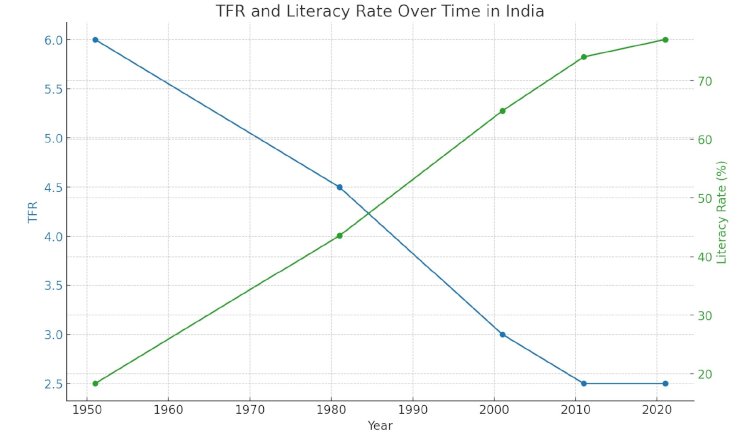
On the other hand, the Muslim-dominated Union Territory of Lakshadweep, with 96% of the population being Muslim, Hyderabad (Telangana) with 41-43% Muslim population, and the Muslim-dominated Keralite district of Malappuram, with 70% Muslim population, report female literacy rates of 88% to 90%, 79%, and 92% to 94%, respectively, and TFRs of 1.5 to 1.8, 1.8 to 2.0, and 1.6 to 1.9 children per woman, respectively. According to the movie, these places, being Muslim-dominated UTs and districts, should have higher TFRs, surpassing 4 children per woman, but this is not the case.
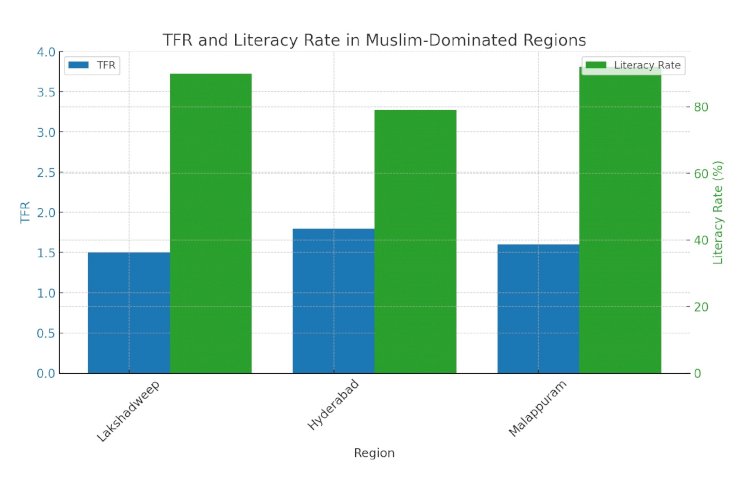
Data from North Indian states such as Uttar Pradesh, Bihar, Rajasthan, and Madhya Pradesh show TFRs of 2.8 to 3, 3.2 to 3.4, 2.7, and 2.7 to 2.9 children per woman, respectively. These rates are higher than those in South Indian states like Kerala, Tamil Nadu, Karnataka, and Andhra Pradesh, which report TFRs of 1.7 to 1.8, 1.6 to 1.7, 1.8 to 2.0, and 1.7 to 1.8 children per woman, respectively.
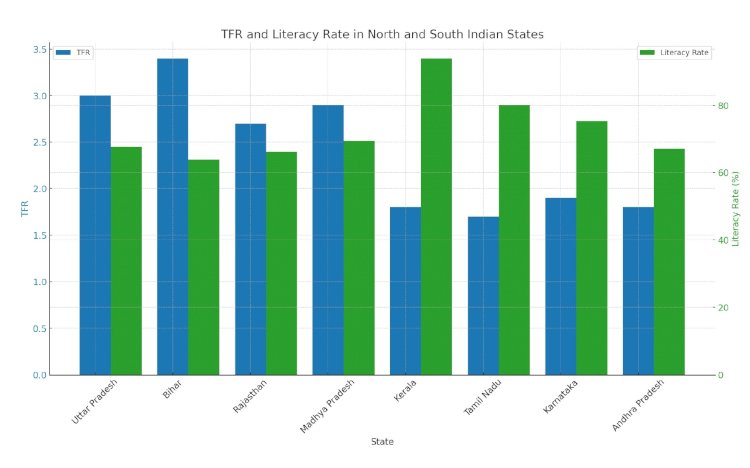
Further examination of the data reveals that the North Indian states of U.P., Bihar, Rajasthan, and Madhya Pradesh have literacy rates of 67.68%, 63.82%, 66.11%, and 69.32%, respectively. These rates are much lower than the South Indian literacy rates of 93.91% (Kerala), 80.09% (Tamil Nadu), 75.36% (Karnataka), and 67.02% (Andhra Pradesh). These data clearly indicate that where education is systematically institutionalised for the public good, the Total Fertility Rate is balanced and well-handled. The data show that Islam is never a reason behind the China-Paar growing population of India, but rather it is the systematic failure and administrative fiasco to provide true education to the female community of India in a fair and just manner.
It is the most ironic joke of the year 2024 in Indian history that political entities plot against Islam and Muslim women to hide their own political failures in implementing the Right to Education (RTE) Act of 2009, which mandates free and compulsory education as a pillar-scheme to educate rural India. These political entities conceal their own administrative lethargy and systematic inertia in academic, social, gender, and women empowerment arenas by taking shelter under the roof of Bollywood film industries targeting Islam and Muslim women through the socially evil content of the movie "Hamare Baarah."
Conclusion
The data presented above clearly demonstrate that religion—be it Islam, Hinduism, Christianity, Sikhism, Jainism, or others—can never be a factor worsening the sensitive issue of population growth. This misconception is deliberately propagated by the movie makers. the new Indian government needs to seriously focus on decisive policy-making, prioritising women's empowerment and healthcare issues, and mitigating gender gaps and caste segregation. A government formed after the recent Lok Sabha Election is meant to serve all citizens of India, not just those who voted for them.
In the final analysis, without sponsoring and politicising film industries like Bollywood, political parties and ruling entities should concentrate on framing policies that address hunger, poverty, illiteracy, caste apartheid, gender discrimination, systemic lethargy, religious politics, and institutional politicisation. Women's education and empowerment should be the top priority.
Religion is not an issue or an element in India's population growth, but the grim conditions of literacy, poverty, and especially female literacy are. If these issues are addressed, population growth will undoubtedly decrease.
References
- Vindu Goel and Jeffrey Gettleman. 02 April 2020. “Under Modi, India’s Press is Not So Free Anymore”. The New York Times.
- Saba Naqvi. 29 April 2024. “Modi Ramps Up Rhetoric in Hindi Heartland as BJP Struggles to Regain its Sparkle”. Frontline Magazine.
- Oishani Bhattacharya. 22 May 2024. “People Offering Namaz Have Vanished from UP Streets: Yogi Adityanath Fires Fresh Salvo at Muslims in Palghar”. AltNews.
- Stateman Web. 19 May 2024. “Hamare Baarah Teaser Sparks Social Media Debate: Netizens Divided”. The Statesman
- Muzaffar Choudhary. 17 January 2024. “Commercialization Of Hate: The Rising Wave of Islamophobia in Bollywood”. The Kashmiriyat.
- Nilosree Biswas. December 2023. “Bollywood’s Depictions of Muslims Over Time Have Gone From Good to Ugly.” TRT World.
- Stateman Web. 19 May 2024. “Hamare Baarah Teaser Sparks Social Media Debate: Netizens Divided”. The Statesman.
- Qur’an Surah Baqarah: 223
- Bollywood Movie “Hamare Baarah’s Teaser.
- Qur’an Surah Baqarah: 223
- Tafsir AL-Suyuti in the Tafsir of the Ayah 223: Baqarah.
- Tafsir Al-Tabari in the Tafsir of the Ayah 223: Baqarah.
- Tafsir Al-Qurtubi in the Tafsir of the Ayah 223: Baqarah.
- Tafsir Al-Jalalayn in the exegesis of Ayah 222: Baqarah
- Surah Al-Baqarah (Chapter 2), Verse 163
- Ibn Abideen Al-Shaami. “Raddu Al-Muhtaar/ Book of Hudud”. Volume 5 Page no. 253.
- Raddu Al-Muhtaar.
- Surah Al-Baqarah, 2:187
- ‘Hamare Do’ Movie Debut Poster.
- ‘Hamare Do’ Movie Debut Poster
- Census of India 2011 (Census of India, Official Website)
- Ministry of Statistics and Programme Implementation (MoSPI) in India, the Census of India website/ Census of India 2011 Fact Sheet
- National Family Health Survey 5 and 6 (NFHS 5,6)
- National Family Health Survey (NFHS-5) Report (2019-20)/ Ministry of Health and Family Welfare, Government of India (official Website)
About the Author:
Nairul SK is a PG research scholar at Darul Huda Islamic University, (Dept. of Islamic Economics and Finance), Kerala, India, and B.A Political Science Hons Student at IGNOU. His research areas include Islamic Economics and Finance, Political Science, Islamic Studies, the Study of Organizational Behavior, and Islamic Psychology.
Disclaimer
The views expressed in this article are the author’s own and do not necessarily mirror Islamonweb’s editorial stance.

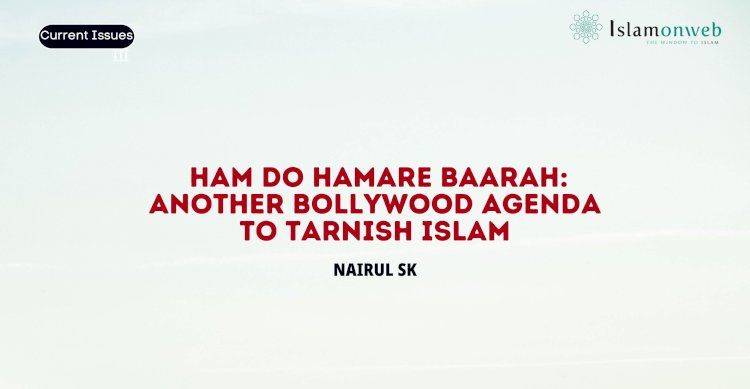





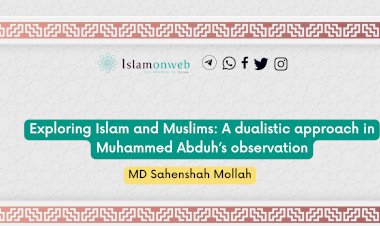

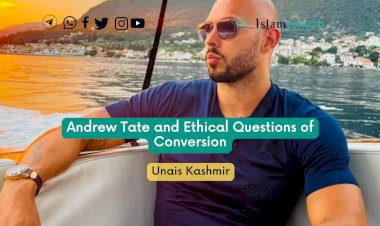














Leave A Comment